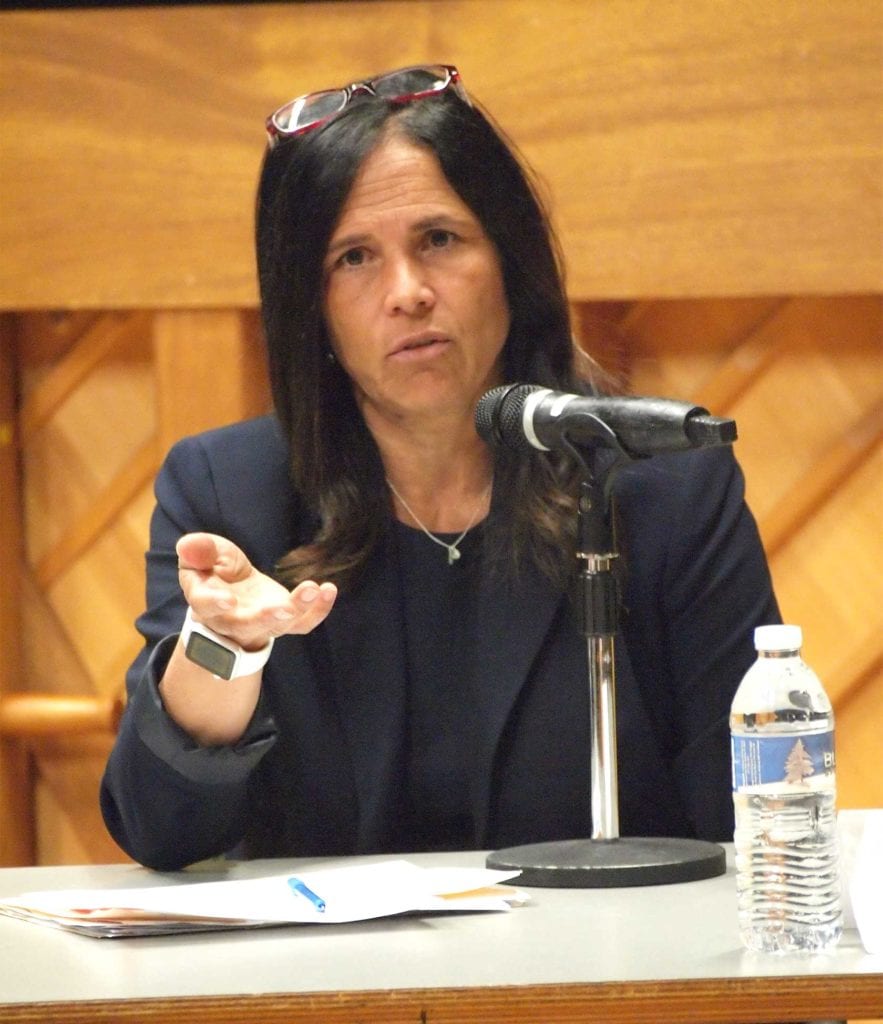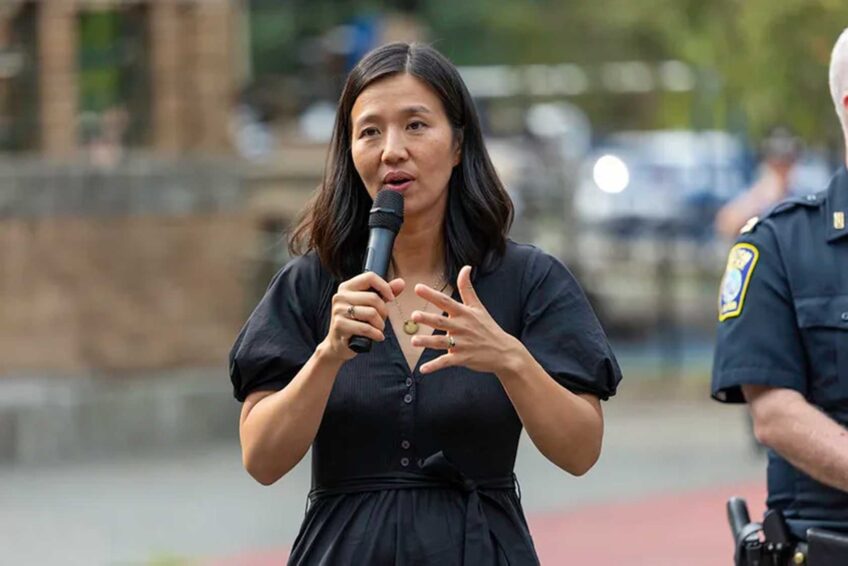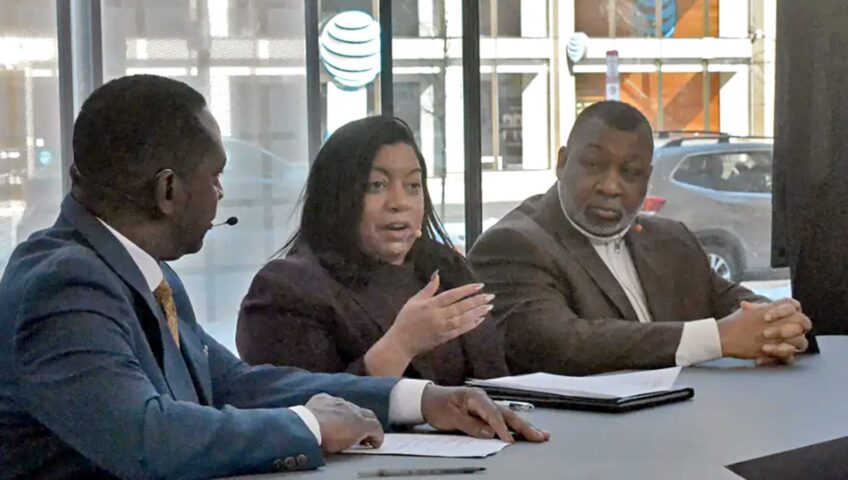Cassellius releases five-year plan for Boston Public Schools
Plan aimed at promoting equity, rigor

Brenda Cassellius, the superintendent of Boston Public Schools, released a strategic plan to the Boston School Committee on Jan. 15. The plan spans five years and addresses issues around unequal access to resources, standardization of curriculums, and inequity in the system.
“This is a real living, breathing, actionable plan that, when we get feedback, we really consider it,” said Cassellius.
The plan focuses on five key goals: to eliminate opportunity and achievement gaps, accelerate learning, amplify all voices, expand opportunity and cultivate trust. The plan was developed after visits to every school in the city, as well as many conversations with Boston community members. The culmination of research revealed “emerging themes” that were prioritized in the plan.
The plan includes input from parents, teachers, and students. Cassellius said that the plan values family engagement and focuses on what the community has to say.
“One of the number one things we heard from the community was about trust — cultivating trust and relationships, and amplifying all voices,” said Cassellius. “And I think when parents see that, that’s not something that’s typical in a strategic plan that I’ve seen in my years as a leader.”
Another priority for Cassellius was an increase in accelerated learning opportunities. Her plan, she said, is to describe academic standards that have not been clearly articulated with the district.
“The state is holding us accountable for advanced coursework within our schools. We know that not all of our high schools are offering advanced coursework and rigorous courses to our students,” she said, adding that part of her transformative plan includes “comprehensively redesigning our high schools” and supporting these high schools in a way they never have been before.
Along with internship and apprenticeship availability, curricular frameworks will change.
“We don’t have consistent curricular frameworks that are used in our schools,” said Cassellius, “and so we want to make sure we have curricular frameworks for our teachers. And they’ve been working on that work most of the year already.” She later added, “We want to make sure everyone knows what we’re shooting for, and what the diploma means.”
Cassellius also hopes to work on “pedagogical frameworks” that measure how teachers deliver the curriculum. Teachers will be better equipped to meet student needs in the classroom, she said. These needs could range from student disabilities to language barriers. Cassellius added that 90% of students in BPS are people of color and 75% of students are high-need.
To improve engagement, Cassellius hopes to provide school-based support to families. Although engagement teams work in the BPS central office, many families hope to have more support staff within the schools themselves. These assistants would work as “navigators” and “ambassadors” within the community to build trust and connections.
“One of the emerging things that [people] asked for is that they would have people in the school buildings who spoke their languages, who understood their lived experiences,” said Cassellius.
Cassellius wants to start with schools that are struggling the most. One of the plan’s commitments targets “fair and equitable funding.” She said that people will see equity “front and center” throughout subsequent investments.
“Equity is not equality,” she said. “Equity is about getting kids that need it the most the resources first, and that’s what people are going to see when they see our strategic budget on Feb. 5.”
Her Feb. 5 budget is an operational plan, she said, that will highlight the “operational excellence that the community wants and expects” of BPS.
“They want to see our buses arrive on time. And they want to be sure when they call us that they’re being communicated with, responded to, in an effective manner that resolves their issue quickly,” she said. “They want to be certain that they have the confidence that things are working well at the district, and that they’re able to get answers to questions.”
Accountability measures are critical, said Cassellius. The central office, teachers and schools will all be held responsible for their actions throughout a “continuous improvement process.”
The measurement of success includes a range of indicators.
“There will be more high-quality schools in neighborhoods that parents are choosing as their first choice, so we’ll see our enrollment go up,” said Cassellius. “We’ll see our attendance is better because students are more engaged. We’ll see teachers happier and feeling more supported through their working-condition survey. We’ll see that principals are engaged and feeling as though parents are connecting with them — there’ll be less complaints. They’ll get more accolades around work. We will see students rise on their achievement scores, and graduation rates go up.”
The “true testament,” however, will be whether the Boston community finds their school system “remarkable,” she said.
Cassellius emphasized the feasibility of her plan by stressing the importance of Mayor Walsh’s recent investment proposals. Walsh announced earlier this month that $100 million in new funding would go to BPS over the next three years.
“I don’t think that people are really capturing the significance of that,” Cassellius said, adding that every single cent would go to her strategic plan.
Furthermore, Walsh proposed $500 million to increase Boston’s affordable housing. This investment will affect children in BPS, Cassellius said, since thousands are currently homeless.
“The housing investments, the rental assistance investments — that’s directly going to impact the children we have in Boston,” she said.
The plan has just entered a 30-day formal review period. The document will be translated and available online. Feedback will be gathered on a website, and formal reviews are also scheduled for the upcoming month.
“After we get that feedback, people will really have the opportunity to say ‘Go stronger here’ or ‘Maybe you missed this area’ or ‘I really like this area,’” said Cassellius. “Honestly, I think we’ll get some really positive feedback.”
Community members can review and comment on the strategic plan at bostonpublicschools.org/strategicplan or attend an in-person review of the plan during the following public meetings:
- Jan. 21 at Mattapan Public Library, 1350 Blue Hill Ave., Mattapan
- Jan. 30 at East Boston Library, 365 S. Bremen St., East Boston
- Feb. 6 at Condon Community Center, 200 D St., South Boston
- Feb. 11 at Thelma D. Burns Building, 575 Warren St., Dorchester
The final strategic plan will be presented to the Boston School Committee on Feb. 26 for approval.
Cassellius hopes to build strong foundations for students throughout BPS, and she stressed the importance for both current and future students.
“Every kid doesn’t get a rewind,” she said.






